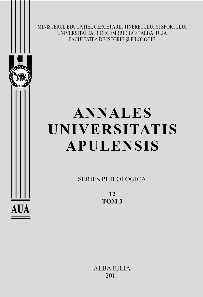Simbolismul luminii în poezia lui Valeriu Anania
The Symbolic Value of Light in Valeriu Anania’s Poetry
Author(s): Lucian Vasile BâgiuSubject(s): Literary Texts
Published by: Universitatea »1 Decembrie 1918« Alba Iulia
Keywords: creation; Christianity; divinity; geneses; light; Logos; poetic art; sacred.
Summary/Abstract: By creating for the worship of divinity, the poet resorts to the usage of a well-known cultural and homogeneous motif from the significance point of view, to whom Christianity and especially mystique paid special attention. We would like to make an observation here: “The opposition light-darkness is (…) in the Occident, that between angels and demons.” While, in Valeriu Anania’s poetry, the opposition light-darkness, rather fading, does by no means express the poetical expression of antagonism. But, it is also very unlikely that the author himself had intended this project, following directly the principle of the initiating-mystical enlightenment of man by divinity, light becoming a means of knowing the transcendent, but also one of offering one chance to soteriology. From this point of view, the symbolism of light is fully accomplished aesthetically in Valeriu Anania’s poetry, becoming a referential matter for any exegetic approach, which aims to underline the religious symbolism in Romanian poetry. The essay attempts to show the great importance that different theses of Christian aesthetics had upon Valeriu Anania’s poetry. One of Cassiodorus’s statements from Exposition of the Psalms imposes as fundamental in the decoding of Valeriu Anania’s aesthetics or, better said, poetics (taking into consideration the concept of poienin meaning to create): “If we make deeper research, there is a certain difference between the things made and the ones created. It is we who can make as we are not meant to create.” An entire poetic art is born around this statement, and Valeriu Anania, while paradoxically dissociating from the great Arghezi, reveals himself in a dramatic attempt to dissimulate the evidence of the understanding and acceptation of the idea that through the work of art the poet will never reiterate the divine creation, but will only perform a succedaneum of it, in conformity with the gift understood as preoccupation…For the author, the term to make and to create are perfect synonyms, sharing a unique signified. Valeriu Anania’s best poems refer to exactly the artist’s status of creator, to his continuous odyssey of self-conviction that the Christic posture and the Logos have a nature similar to that of the poet and the artistic word, inviting to dramatic metaphysical meditations. By believing in the sacredness of the artistic act, Valeriu Anania considers that he does not make poetry as in the Arghezian skill, but that he performs a creation similar to the primordial one. The conceiver of good stanzas is not, in Valeriu Anania’ s poetry, a heretical or rebellious master, but a believer who creates within the Holy Spirit with his own words received from the Word: “We are told that Moses, as he was stuttering delegated his brother Aron, to speak to the people for him. A receiver of revelation, he could not be at the same time an instrument of communication as well but only a filter between the Logos and utterance. This is how I see the relat
Journal: Annales Universitatis Apulensis. Series Philologica
- Issue Year: 12/2011
- Issue No: 1
- Page Range: 187-208
- Page Count: 12
- Language: Romanian

